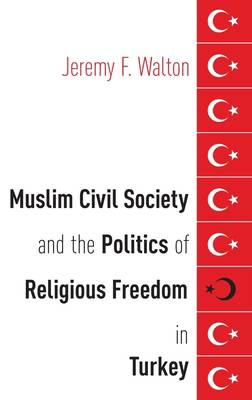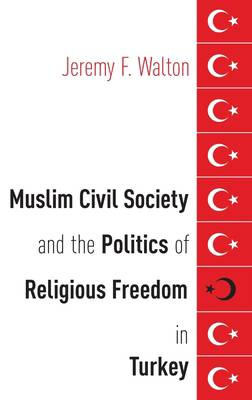
Bedankt voor het vertrouwen het afgelopen jaar! Om jou te bedanken bieden we GRATIS verzending (in België) aan op alles gedurende de hele maand januari.
- Afhalen na 1 uur in een winkel met voorraad
- In januari gratis thuislevering in België
- Ruim aanbod met 7 miljoen producten
Bedankt voor het vertrouwen het afgelopen jaar! Om jou te bedanken bieden we GRATIS verzending (in België) aan op alles gedurende de hele maand januari.
- Afhalen na 1 uur in een winkel met voorraad
- In januari gratis thuislevering in België
- Ruim aanbod met 7 miljoen producten
Zoeken
Muslim Civil Society and the Politics of Religious Freedom in Turkey
Jeremy F Walton
€ 298,45
+ 596 punten
Omschrijving
The sway of Islam in political life is an unavoidable topic of debate in Turkey today. Secularists, Islamists, and liberals alike understand the Turkish state to be the primary arbiter of Islam's place in Turkey--as the coup attempt of July 2016 and its aftermath have dramatically illustrated. Yet this emphasis on the state ignores the influence of another field of political action in relation to Islam, that of civil society. Based on ethnographic research conducted in Istanbul and Ankara, Muslim Civil Society and the Politics of Religious Freedom in Turkey is Jeremy F. Walton's inquiry into the political and religious practices of contemporary Turkish-Muslim Nongovernmental Organizations. Since the mid-1980s, Turkey has witnessed an efflorescence of NGOs in tandem with a neoliberal turn in domestic economic policies and electoral politics. One major effect of this neoliberal turn has been the emergence of a vibrant Muslim civil society, which has decentered and transformed the Turkish state's relationship to Islam. Muslim NGOs champion religious freedom as a paramount political ideal and marshal a distinctive, nongovernmental politics of religious freedom to advocate this ideal. Walton's accomplished study offers a fine-grained perspective on this nongovernmental politics of religious freedom and the institutions and communities from which it emerges.
Specificaties
Betrokkenen
- Auteur(s):
- Uitgeverij:
Inhoud
- Aantal bladzijden:
- 270
- Taal:
- Engels
- Reeks:
Eigenschappen
- Productcode (EAN):
- 9780190658977
- Verschijningsdatum:
- 1/05/2017
- Uitvoering:
- Hardcover
- Formaat:
- Genaaid
- Afmetingen:
- 157 mm x 236 mm
- Gewicht:
- 498 g

Alleen bij Standaard Boekhandel
+ 596 punten op je klantenkaart van Standaard Boekhandel
Beoordelingen
We publiceren alleen reviews die voldoen aan de voorwaarden voor reviews. Bekijk onze voorwaarden voor reviews.









